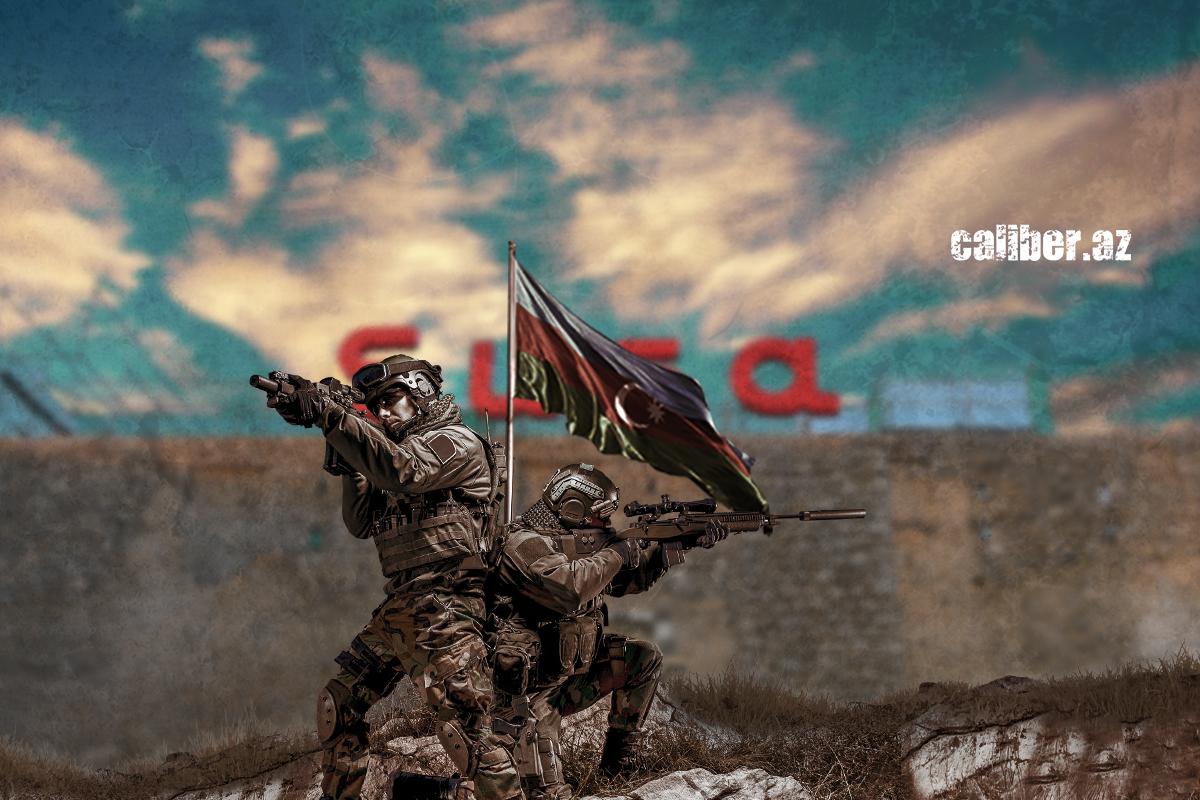Azerbaijan's Karabakh victory inspires Georgia's restoration of territorial integrity Precedent for resolving separatism
On November 8, 2024, Azerbaijan marked the Victory Day in the Second Karabakh War. This day not only commemorates Azerbaijan’s triumph in the 44-day conflict but also symbolizes the hope for the eventual restoration of Georgia's territorial integrity.
The trilateral statement, signed on November 9, 2020, by the leaders of Azerbaijan, Armenia, and Russia, was a historic moment in post-Soviet space. For the first time, it mandated that separatists and occupiers leave the territories they had previously seized. This withdrawal occurred "under the supervision" of Russian military "peacekeepers," who, until then, had typically supported separatists in conflicts across the post-Soviet region.
After Azerbaijan's victory in Karabakh, more than 300,000 Georgian refugees from Abkhazia and the Tskhinvali region regained hope of returning to their homeland. Before the 44-day war, they, like over one million Azerbaijani refugees from Karabakh, had never witnessed a precedent of justice being restored—when the victims of ethnic cleansing and genocide, along with their descendants, are able to return to their ancestral lands. A whole generation was born and raised without seeing the cities and villages of their parents, and for many, the dream of returning to their homes began to seem impossible. Azerbaijan's victory turned these dreams and hopes into a reality. It also caused separatists and Armenian militants, who had seized the "trophy" homes of the murdered and expelled Georgians in Sukhumi, Gagra, and other cities and villages of Abkhazia, to tremble and become anxious.
Azerbaijan's victory in Karabakh demonstrated to neighboring countries, especially Georgia, that even long-standing territorial issues can be resolved with a well-structured foreign policy. Azerbaijan's example also highlighted the importance of understanding geopolitical realities—avoiding both illusions and emotional responses. In Baku, there was a clear understanding of both the role played by the leadership of the Soviet Union and Russia in triggering the Karabakh conflict and the first Karabakh War, as well as the hypocrisy of the West, particularly France and the United States, in the Karabakh issue. However, Azerbaijan's leadership managed to build relations with both Russia and the West in such a way that, when the crucial moment arrived, these geopolitical powers did not (or could not) prevent the restoration of Azerbaijan's territorial integrity.

A key factor in Azerbaijan's victory was the moral support from Türkiye, which, as a friendly country and an important strategic partner, is also vital to Georgia. At the same time, by restoring its territorial integrity, Azerbaijan is deepening cooperation with Russia, particularly within the framework of the North-South Corridor. Azerbaijani energy supplies continue to flow through Georgia and Türkiye to European countries, while partnerships with Italy, Hungary, Serbia, and other European nations are expanding. The Middle Corridor's transit is growing, and cooperation with Central Asian countries and China is also strengthening.
Georgia's involvement, alongside Türkiye and Azerbaijan, in large-scale economic projects—particularly in transit—has not only contributed to the growth of Georgia's economy, but also highlighted the destructive nature and historical futility of separatist movements. It has become clear that separatist "fragments" and disputed territorial issues create nothing but problems in international politics. The realization of the hopelessness of supporting separatism, after Azerbaijan's territorial integrity was restored, has also been acknowledged by many clear-thinking politicians in Russia.
The occupied regions of Abkhazia and the Tskhinvali region provide no significant benefit to Russia, aside from the costs associated with supporting the excessively corrupt separatist puppets. These regions have become "logistical dead ends" instead of being integrated into promising international transit corridors that could benefit Russia if they were reintegrated into Georgia. By pursuing a rational and pragmatic policy towards Russia, much like Azerbaijan, Georgia has already made significant progress. In Moscow, discussions are now taking place regarding the possibility of reconciliation between Georgians, Abkhaz, and Ossetians. There are talks about the potential return of Abkhazia and the Tskhinvali region to Georgia, in various formats. Prior to the 44-day war, even the theoretical possibility of such a development was never considered in Russia.
It is important to note the crushing defeat suffered by the Armenian occupiers in 2020. They had every opportunity to avoid bloodshed. Moreover, by agreeing to the peaceful deoccupation of Karabakh, they could have secured unprecedented benefits for the Armenians living there (excluding the illegal settlers). However, the Armenian side refused even to begin partial deoccupation of Azerbaijani lands. As a result, Azerbaijan was forced to restore its legal rights by force. In the end, illegal Armenian settlers had to hastily leave the homes of Azerbaijanis they had unlawfully occupied in the territories being liberated from occupation after November 9, 2020, leaving behind a trail of looting and destruction of everything they could destroy.
The consequences of the separatists' policies and their refusal to engage in dialogue and compromise serve as a valuable lesson for the Abkhaz and Ossetians. There is no alternative to reconciliation with the Georgian people and peaceful coexistence within a united Georgian state (where Abkhazia is guaranteed autonomy and the state status of the Abkhaz language). The process of reconciliation between Georgians, Abkhaz, and Ossetians has effectively already begun "at the grassroots level," as evidenced by the increasingly common trips by residents of the occupied territories to the non-occupied areas of Georgia, particularly for medical assistance.

Undoubtedly, overcoming the consequences of decades of separatist propaganda fueled by hatred is a difficult task. However, the government of Georgia has already taken steps toward reconciliation with the Abkhaz and Ossetians. Bidzina Ivanishvili, leader of the ruling party Georgian Dream, has spoken about the possibility of offering apologies to the Ossetians in order to foster peaceful coexistence within a united state. It is hoped that similar steps will be taken by the Ossetians and Abkhaz in return. Unfortunately, no such steps were taken by the Karabakh Armenians when Azerbaijan persistently offered reconciliation and reintegration. Instead, succumbing to separatist propaganda and intimidation, most of them chose to leave Karabakh in 2023.
When analyzing the conflicts in Azerbaijan’s Karabakh and Georgia’s Abkhazia and Tskhinvali regions, it is important to understand that the "Artsakh" separatist project was the first of its kind in the post-Soviet space. It served as the model for later separatist movements, often fueled by similar Armenian emissaries, which ignited conflicts in the South Ossetian Autonomous Region and the Abkhaz ASSR of the Georgian SSR.
During the separatist war in Abkhazia, Armenian militants fought alongside the separatists, including the notorious Battalion named after Baghramyan, infamous for its atrocities against peaceful Georgian civilians. There is information that during the wars of 1992-1994, Armenian militants were regularly transferred between Karabakh and Abkhazia. Even in the autumn of 2020, when the separatists and Armenian occupiers suffered a crushing defeat in Karabakh, reinforcements from the Baghramyan Battalion in Abkhazia came to their aid, personally welcomed by the then separatist leader Arayik Harutyunyan.
The separatist regimes in Khankendi, Sukhumi, and Tskhinvali recognized each other’s so-called "independence," established so-called "diplomatic relations," and were officially "allies," signing treaties of "friendship" and "mutual assistance." Azerbaijan’s victory turned these so-called "international agreements" into worthless pieces of paper.
The military defeat of the Armenian occupiers and separatists during the 44-day war demonstrated the futility and unsustainability of such projects and the vain hopes for their "international recognition." The fate of the separatist "Artsakh," in one form or another, will inevitably await the separatist projects in Abkhazia and the Tskhinvali region.
The full dismantling of these fake pseudo-"state" entities is delayed by the efforts of the Armenian lobby in Russia. This lobby, which facilitates the settlement of ethnic Armenians in separatist Abkhazia, seems to view the territory as a "second Armenian state" to replace the eliminated so-called "Artsakh." However, Russia’s geopolitical interests lie in having friendly and reliable neighbors—both a unified and friendly Azerbaijan and a unified and friendly Georgia.
Vladimir Tskhvediani, Georgia, for Caliber.Az








